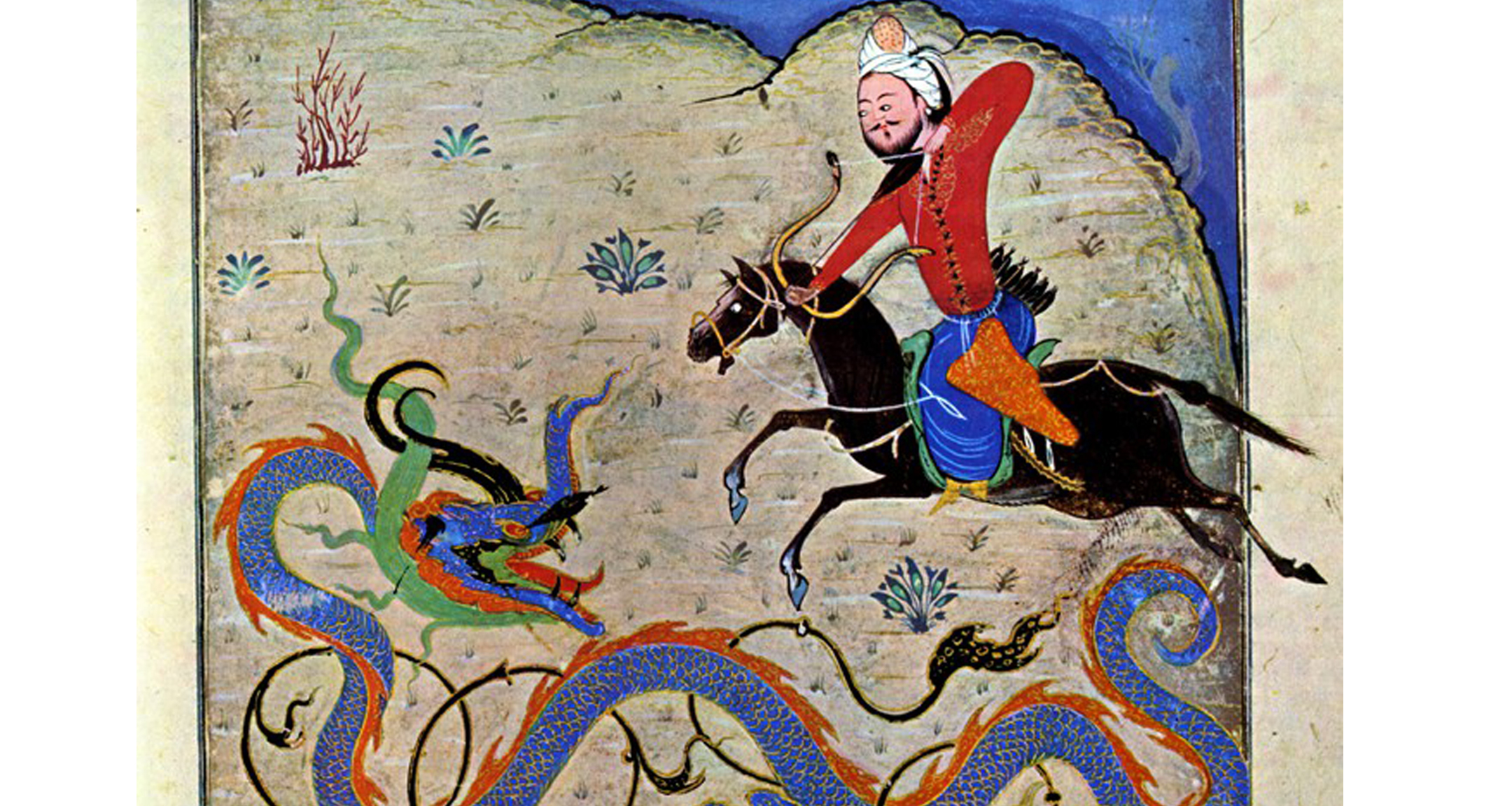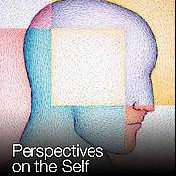423 Vote
The dragon-catcher: allegory of the imperious self

“A snake-catcher went to the mountains to catch a snake by his incantations…”. Using this tale recounted by the Persian mystical poet Rumi as a starting point, Leili Anvar introduces here the notion of imperious self.
The imperious self is a central concept in Ostad Elahi’s philosophy. It is this product of the human psyche against which we must relentlessly struggle in order to make spiritual progress, for it is the origin of those of our impulses that systematically and insidiously arise to contradict correct ethical thoughts.
In her analysis of Rumi’s anecdote, shedding some light on its moral and spiritual significance, Leili Anvar reminds us of the power of this “hideous dragon roaring like a lion” that can devour us instantly even though it seemed asleep… Rather than merely describing its various manifestations and deceptions, she underlines the “risk avoidance strategy” that was prescribed by the spiritualities of the past to deal with the imperious self. The idea was to retire from society so as to keep the imperious self away from all stimulation. Leili Anvar thus identifies one of the characteristics of Ostad Elahi’s spirituality, that is, the fact that rather than sedating the imperious self, we should battle it head-on.
The tale of the snake-catcher
, Vol. III & IV, transl. Reynold A. Nicholoson, London: Messrs Luzac & Co., 1925-1940.A snake-catcher went to the mountains to catch a snake by his incantations.
(…)
He (the snake-catcher) was searching round about the mountains for a big snake in the days of snow.
He espied there a huge dead dragon, at the aspect whereof his heart was filled with fear. (Whilst) the snake-catcher was looking for snakes in the hard winter, he espied a dead dragon.
(…)
The snake-catcher took up that snake and came to Baghdad for the sake of (exciting) astonishment.
In quest of a paltry fee he carried along a dragon like the pillar of a house,
Saying, “I have brought a dead dragon: I have suffered agonies in hunting it.” He thought it was dead, but it was living, and he did not see it very well.
It was frozen by frosts and snow: it was alive, but it presented the appearance of the dead.
(…)
The snake-catcher, with a hundred pains, was bringing the snake along,
Till (at last) the would-be showman arrived at Baghdad, that he might set up a public show at the cross-roads.
The man set up a show on the bank of the Tigris, and a hubbub arose in the city of Baghdad—“A snake-catcher has brought a dragon: he has captured a marvellous rare beast.”
Myriads of simpletons assembled, who had become a prey to him as he (to it) in his folly. They were waiting (to see the dragon), and he too was waiting for the scattered people to assemble.
(…)
When he (the snake-catcher) began to move the cloth (which covered the dragon), the people in the crowd strained their throats (necks),
And (saw that) the dragon, which had been frozen by intense cold, was underneath a hundred kinds of coarse woollen cloths and coverlets.
He had bound it with thick ropes: that careful keeper had taken great precaution for it. During the delay (interval) of expectation and coming together, the sun of ‘Iraq shone upon the snake.
The sun of the hot country warmed it; the cold humours went out of its limbs.
It had been dead, and it revived: from astonishment (at feeling the sun’s heat) the dragon began to uncoil itself.
By the stirring of that dead serpent the people’s amazement was multiplied a hundred thousand fold.
With amazement they started shrieking and fled en masse from its motion.
It set about bursting the bonds, and at that loud outcry (of the people) the bonds on every side went crack, crack.
It burst the bonds and glided out from beneath—a hideous dragon roaring like a lion.
Many people were killed in the rout: a hundred heaps were made of the fallen slain.
The snake-catcher became paralysed with fear on the spot, crying, “What have I brought from the mountains and the desert?”
The blind sheep awakened the wolf: unwittingly it went towards its ‘Azra’il (Angel of death).
The dragon made one mouthful of that dolt (…). It wound and fastened itself on a pillar and crunched the bones of the devoured man.
The dragon is thy sensual soul: how is it dead? It is (only) frozen by grief and lack of means.
(…)
That dragon, under stress of poverty, is a little worm, (but) a gnat is made a falcon by power and riches.
Keep the dragon in the snow of separation (from its desires); beware, do not carry it into the sun of Iraq.
So long as that dragon of thine remains frozen, (well and good); thou art a mouthful for it, when it gains release.
Mortify it and become safe from (spiritual) death; have no mercy: it is not one of them that deserve favours;
For (when) the heat of the sun of lust strikes upon it, that vile bat of thine flaps its wings.
Lead it manfully to the (spiritual) warfare and battle: God will reward thee with access (to Him). (…)
Dost thou hope, without using violence, to keep it bound in quiet and faithfulness?
How should this wish be fulfilled for any worthless one? It needs a Moses to kill the dragon.The Mathnawi of Jalalu’ddin Rumi, The Novel of the Soul
The following is a written adaptation of a lecture given by Leili Anvar in French.
This tale is an excerpt from the educational work of the thirteenth century Persian mystical poet Rumi, in which he recounts anecdotes like this one and draws spiritual lessons from them. Here the imperious self is depicted as a snake or a dragon, or perhaps something in between. It is a classic metaphor for the imperious self. The main point of the tale is that for as long as we live in our physical bodies, the imperious self will not die. It may sometimes stand still, but it never actually dies.
The notion of “imperious self”
Before I go on with my analysis of the story, some clarifications about the imperious self might be useful. The imperious self is the source of the most powerful tendencies, impulses and desires of our psyche. It automatically and systematically rises against correct divine or ethical ideas or actions, and it truly loves everything that contradicts such ideas or actions. Actually, our natural and universal tendency toward forbidden pleasures originates in the imperious self. It often, initially at least, operates by means of frontal attacks, in which case we clearly see it—we know for a fact it is not dead. But if we resist, it starts using trickery and deception: it plays dead, but then reappears in another form, and most importantly it infiltrates our reason and gets it to legitimize its suggestions.
The desires of this imperious self often take the form of sweet temptations and suggestions that are very attractive for the ego. But whatever their form, these suggestions act like a poison for the soul if we follow them.
“He thought it was dead, but it was living…”
Let us now get back to our tale and its dragon. What this tale tells us is that when the imperious self is far from the incitements and temptations of social life, when it is far from the “sun of lust”, it is as if it was frozen, and we might think it has been neutralised or even that it is dead. The metaphor of the mountain, the snow and the ice is used here to convey the idea that the imperious self is isolated, lost, that it has no way of expressing itself because of how cold it is. It seems to be completely “out of service” so to speak. This metaphor can be used to illustrate a life withdrawn from society, an ideal upholded by many traditional spiritualities. If we retire to a mountain away from all solicitation, away from the heat of passions, we basically freeze our imperious self. So, absolute asceticism, involving withdrawal from society, is like a shelter in the mountains, where the imperious self is preserved from all solicitation or temptation. It thus keeps quiet, on the surface at least, not showing its true colours.
In such a context it seems very easy to catch it, tie it down, and even drag it back to town and put it on display like a monster we would have defeated. That is what happens in the story: the snake-catcher had no trouble defeating and catching the dragon because it appeared to be dead, but he then shows off a little bit: “I have suffered agonies in hunting it”, he says. He has brought back a very impressive beast indeed and he makes a big show out of it. This is typical of those who think they have defeated their imperious self through ascetic practices, when they have actually only sedated it.
“The blind sheep awakened the wolf…”
Rumi clearly tells us that the snake-catcher has made a serious error of judgement. He calls him a “blind sheep” and a “dolt”. Because not only did he want to show off, pretending that he had “suffered agonies” in hunting this dragon when he really did not have such a hard time catching it (the only difficult part was to drag it back to town!), he also did all of this for the purpose of making money. In fact, all the allurements of power, pride, self-image and ego are at stake in what he is doing. We could have thought that he had killed his imperious self while he was away from society and all temptations, but it isn’t actually the case.
In this regard, Ostad Elahi also clearly says that for as long as we live, we should not lower our guard and be wary of the imperious self, because until we reach perfection, there will always be a risk. This explains why Rumi says: “The dragon is thy sensual soul: how is it dead?”. If it could die during our lifetime on earth, surely we would know about it! The truth is that “it is (only) frozen by grief and lack of means”, that is, by lack of incitements that would enable it to show how alive it really is.
Why is that the case? Because it is through those incitements that the imperious self reveals its true colours, that of a monster who will make short work of those who do not know how to control it; that of a “hideous dragon roaring like a lion”. If we do not fight the imperious self head-on and if we do not truly control it as a result of this head-to-head battle, a few hours under the “sun of lust” will be enough to bring it back to life. This “sun of lust” includes all the incitements that, in one way or another, satisfy the ego and thus bring back to life those whims and desires that seemed frazzled until we had actually confronted them.
“Mortify it and become safe from (spiritual) death; have no mercy: it is not one of them that deserve favours”
Rumi thus warns his readers against the potential of violence or even death that lies within every human being, in the form of a dangerous dragon. When he talks about death, he means of course the death of the soul. The idea is that if we let ourselves be duped and let the imperious self invade us, it might even lead to the death of our soul. This is why the poet uses such warlike terms, to describe the battle that we need to engage in head-on against this powerful inner monster. That said, despite the accuracy of his vision of the imperious self and its potential dangers for each human beings, the discourse of this great mystic remains in keeping with traditional spirituality. Indeed, after explaining that the dragon is merely asleep when it is kept away from all stimulation, he goes on by saying: “Keep the dragon in the snow of separation (from its desires); beware, do not carry it into the sun of Iraq.”
Rumi lived in the 13th century, it is thus very natural for him to stick to the traditional vision of spirituality according to which the imperious self should be put in the freezer. There is no better way for it not to wake up. We know however from his biography that as a spiritual master, he never enjoined his students to retire from the world, to live away from society or worldly preoccupations, far from it. His disciples always lived in society. But to him, the way to fight was to be in a state of total inner retirement, that is, to practice asceticism in one’s daily life, through constant fasting, constant meditation, by staying up all night to pray, vowing chastity if possible, etc. So Rumi did prescribe a method of battling the imperious self: a method that cuts off the imperious self from the stimulation that could awaken it. That is why he says that we should “mortify it”, that we should “have no mercy”, that we should kill the imperious self. What he does not say is that we should actually engage in another form of battle—this form of head-to-head battle was developed by Ostad Elahi in his view of spirituality.
Further readings:
 |
In vivo spirituality excerpt of a lecture by B. Elahi, MD
As far as spirituality goes, a purely theoretical approach to principles, detached from actual practice, will not do. Not only is it inefficient, it constitues a genuine impediment to spiritual progress: that of smugness or spiritual “superioritism”. [read more] |
|
 |
Self-knowledge and the practice of ethics
Why does self-knowledge matter? How and why is it connected to the practice of ethics? Elie During, Associate Professor in the Philosophy Department of the University of Paris – Ouest Nanterre, addresses these questions in an article published in a special issue of the Annals of the New York Academy of Sciences entitled “Perspectives on the Self”. [read more] |
|
 |
Ostad Elahi: a spiritual heritage
The significance of Ostad Elahi and Malek Jân Nemati’s spiritual heritage is discussed during an interview of two specialists of the mystical traditions of Iran: Leili Anvar, Associate Professor of Persian literature at the Institut National des Langues et des Civilisations Orientales (Paris), and Christian Jambet, islamologist and Professor of philosophy (Paris). [read more] |
|
 This work is offered under a Creative
Commons licence
This work is offered under a Creative
Commons licence

 News
News Podcast
Podcast




Thanks for this great story from Rumi, which can easily teach us how our imperious self lies in wait to possess us totally in one sudden attack.
I found myself thinking, “I know this, there is nothing new here for me. I do not engage in asceticism and I am not so foolish as to think I have defeated my imperious self.” And then it occurred to me how this very kind of thinking is like those “hundred kinds of coarse woollen cloths and coverlets” warming my imperious self and making it ready to strike at the very first rays of the sun… And so I must thank you for warning me how close I am to being that “blind sheep”….that “dolt” as Rumi so aptly puts it.
“His disciples always lived in society. But to him, the way to fight was to be in a state of total inner retirement, that is, to practice asceticism in one’s daily life, through constant fasting, constant meditation, by staying up all night to pray, vowing chastity if possible, etc. So Rumi did prescribe a method of battling the imperious self: a method that cuts off the imperious self from the stimulation that could awaken it.”
Thank you for this, it is the first time I hear that one can live in society whilst cutting oneself off from the imperious self. I had always thought that classical spirituality implied necessarily leaving society and living in isolation, and I had never heard of an approach such as Rumi’s.
Really enjoyed the story and analysis. Universal truths do not date but hopefully our understanding can evolve. How not to leave the dragon sleeping nor put it to the sword…… the battle rages!
No offense to Rumi lovers, I was one of them until actually very recently. I used to memorize his poems and proudly reciting them and enjoying them a lot! But all those thousands and thousands of lines of poetry what did I learn? How did it change me? Even in this story, did he talk about the exact nature of the imperious self, what it really is? how to recognize it? how to fight against it and what are the tools to do so? where exactly is it originated from? And why is it harmful? How much of it is harmful? I had never heard answers to such questions until I read Ostad Elahi’s teachings. It is great reading the story of the kings, the birds and simourgh, the frozen dragon the poor snake catcher and reciting “نفس اژدرهاست او کی مرده است – از غم بی آلتی افسرده است” “The dragon is thy sensual soul: how is it dead? – It is only frozen by grief and lack of means.” It’s beautiful isn’t it? But what is in it for me?
It is like me being blind and asking for guide and direction in the desert from a wise man, and the wise man just points his finger vaguely toward some unknown direction and says “there”. You try your best to find out where exactly the wise man is pointing at, to no avail. You are blind and the wise man, I don’t know maybe he didn’t even know where exactly he was going to let alone guiding others!
Sadly I must confess that I greatly lack knowledge on the great Sufis, such as Rumi, Attar, Hallaj, etc. I have become an avid reader & listener of Leili Anvar’s, who is just an inexhaustible well of knowledge on the subject. I find it interesting to learn how these outstanding Persian traditional figures walked their own spiritual paths as well as taught their students.
I really enjoyed and learnd many things from this story.